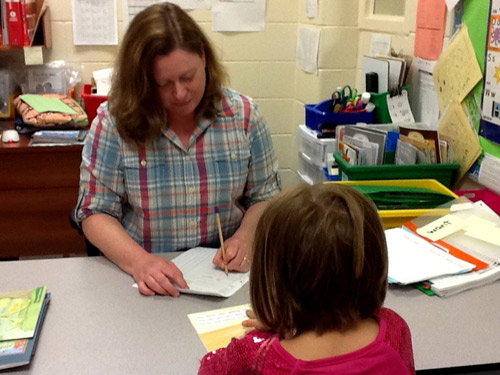
Education Matters / June 2013
An early reading intervention program is proving to be very successful in helping young students reach or even surpass grade-specific reading levels.
Since October, the Halton District School Board has been implementing the Leveled Literacy Intervention Program (LLI) in 11 schools. It’s a small group intervention strategy designed for students who find reading and writing difficult. Teachers are working with students to successfully close the gap and reach grade level performance within 16 weeks. Ultimately, it instills greater confidence and motivation in students and enables them to access deeper learning in all parts of the Ministry of Education curriculum.
Learning Resource Teachers (LRT) teach LLI. In each school, small groups of students are taught various reading techniques for 40 minutes a day. Techniques include students re-reading familiar books they have read previously in a lesson, a five minute phonics principle taught in which students use magnetic letters, picture and word cards and the teacher and student working together to learn to write high frequency words quickly and accurately.
“Parents and classroom teachers have commented how they have noticed students in the LLI program are much more confident, both in the class and at home,” said Yvonne Messenger, LRT with Escarpment View Public School in Milton. “Students who began the year sitting quietly and not participating in classroom activities are now among the first to have their hand up and like to share their ideas during class activities.”
Tricia Dyson, Superintendent of Education, said the program is an initiative of the Board’s 2012-16 Multi-Year Plan. One of the Multi-Year Plan goals is “every Kindergarten to Grade 3 student will receive intensive guided instruction in reading, and those who require assistance to reach their grade level target will be assessed and supported with a Tier 2 intervention”.
An integral part of the program – and one that can really shape LLI’s success – is the involvement or “partnership” of parents, Dyson explained. She said parents are asked to commit to do their own version of homework, which includes reading to their child every night. Such involvement bolsters the program and gives students the understanding that everyone is in this together to strengthen reading behaviours.
Dyson referenced a parent commenting that during a parent-teacher interview meeting, her son grabbed a book he hadn’t read before and read it entirely on his own, fluently and accurately. Dyson also added this parent said her ability to understand how to help her son with reading had “skyrocketed” as a result of her child’s participation in LLI. Other parents asked that more challenging books be sent home with their child because the child was doing so well, Dyson said.
Based on data, every child in the program has improved, Dyson said. LLI results shows students receiving this intervention are catching up with their peers, and, in some cases, passing them in reading ability.
“Our objective is every student in the program is at the reading level they should be by the end of Grade 1,” Dyson explained. “I think this program is going to positively change the educational pathway for many students in our Board. It’s amazing how disengaged students are now fully engaged with reading and are excited about reading.”
LLI has been a particularly effective program in Escarpment View Public School for English as a Second Language students, said Principal Beverly Faulknor.
“A student, who is normally bashful and shy, readily read a book with me,” she explained. “He was proud of his accomplishment. The LLI program is giving readers the confidence to share and develop the pride in reading that one would like each child to foster.”
Dyson added: “LLI is a great gap closing strategy that is making a difference for the students and their future.”